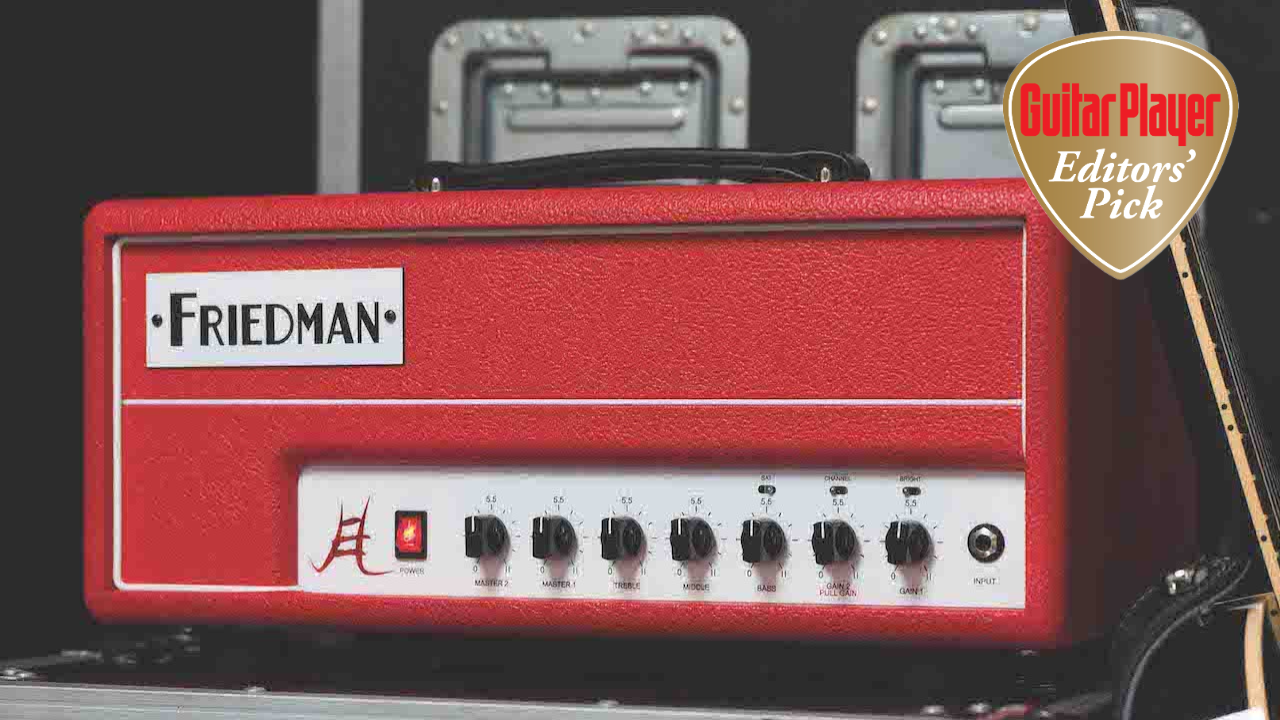All the latest guitar news, interviews, lessons, reviews, deals and more, direct to your inbox!
You are now subscribed
Your newsletter sign-up was successful
A few years ago, while in rehearsals with his band, Red Dragon Cartel, revered hard rocker Jake E. Lee decided to try out a new amp that had recently shown up at his studio: a Friedman Smallbox 50.
According to the amp’s maker, Los Angeles guitar gear guru Dave Friedman, the Ozzy-pedigreed shredder immediately fell in love with the head and proceeded to use it every night of his ensuing tour. Soon thereafter, the guitar star and the builder teamed up to create a limited run of high-gain 100-watt arena-ready Jake E. Lee signature JEL-100 heads.
While those amps quickly sold out, anyone curious about their sound – or, frankly, anyone who loves kick-ass rock amps in general – can rejoice: A new, more attainable version of the JEL amp is available. And though it is smaller than its forebear, it’s no less compelling.
Enter the Friedman JEL-20. Featuring a birch-ply cabinet dressed handsomely in a snazzy red Tolex tuxedo, and sporting Lee’s three initials in a cool Japanese calligraphy-style logo on its faceplate, this fun-size 20-watt JEL, which is bigger than so-called lunchbox amps but smaller than most other amp heads, is just plain adorable.
However, as is the case with another rowdy Hollywood redhead, that doll from the Chucky movies, it only seems cute until you get it fired up. Then you realize this thing fights well above its weight class.
While it has knobs that cheekily go to 11, this 20-watt JEL obviously can’t match the volume headroom and low-end girth delivered by a 50- or 100-watt head. But if you’re among the uninitiated, you’ll be surprised how loudly and clearly two EL84s can crank, and how gig-ready this amp is.
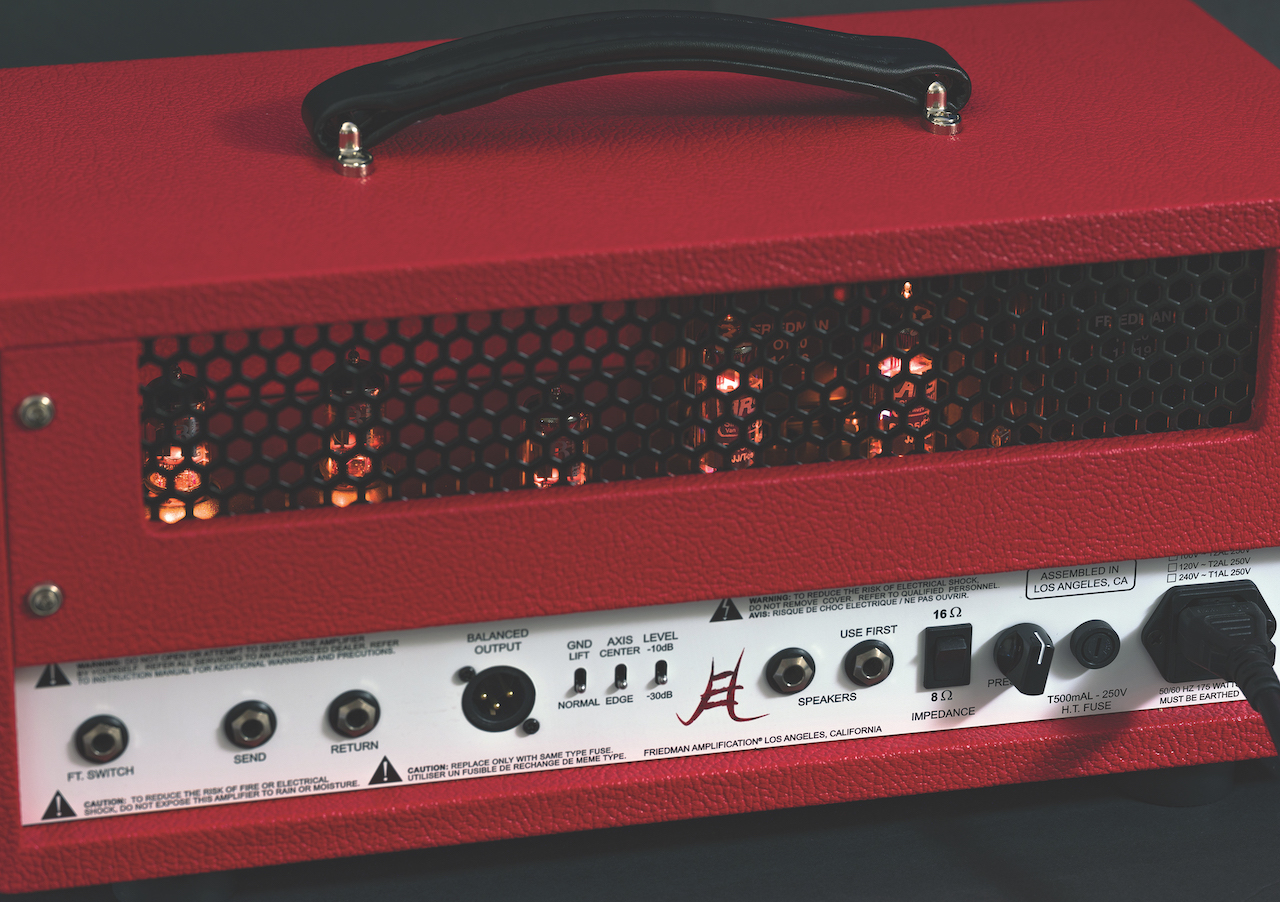
On a string of fly dates all over the country with Jefferson Starship, the JEL-20 roared authoritatively through every variation of rented Marshall 4x12 I plugged it into. On at least two occasions, our mix engineer shouted to me at soundcheck, “Hey, can you turn down a little so I can put more of you in the P.A.?” If he only had a dollar for every time he’s told a guitar player that!
All the latest guitar news, interviews, lessons, reviews, deals and more, direct to your inbox!
The flagship feature on the JEL-20 is, of course, “Jake mode,” which is achieved by activating channel 2 (which you can do via either the front-panel channel switch or the included foot switch) and pulling out the gain 2 knob, which engages a Lee-approved gain boost.
Do this, and your fingers will feast on deliciously smooth, goosed JCM 800–style distortion boasting more than enough compression to make single-note shred lines sing. It’s a satisfying setting, and I would have used it more often if doing so didn’t require walking back to the amp and pulling the knob out.
Truth is, I rarely needed that extra gain. For both lead playing and for big rock rhythm riffs, I was plenty thrilled with channel 2’s unboosted sound, so I generally left the gain 2 knob pushed in. This is Mr. Friedman’s go-to overdrive recipe, and it’s a good one.
Running an Ernie Ball Music Man Sabre with two direct-mounted humbuckers into the amp, I was rewarded with ferocious distortion that still had plenty of backbone. Once in a while, I did kick in a Keeley compressor to slightly increase sustain. But even sans pedal, the notes were huge and easily coaxed into musical feedback, even when I was far from the Celestions.
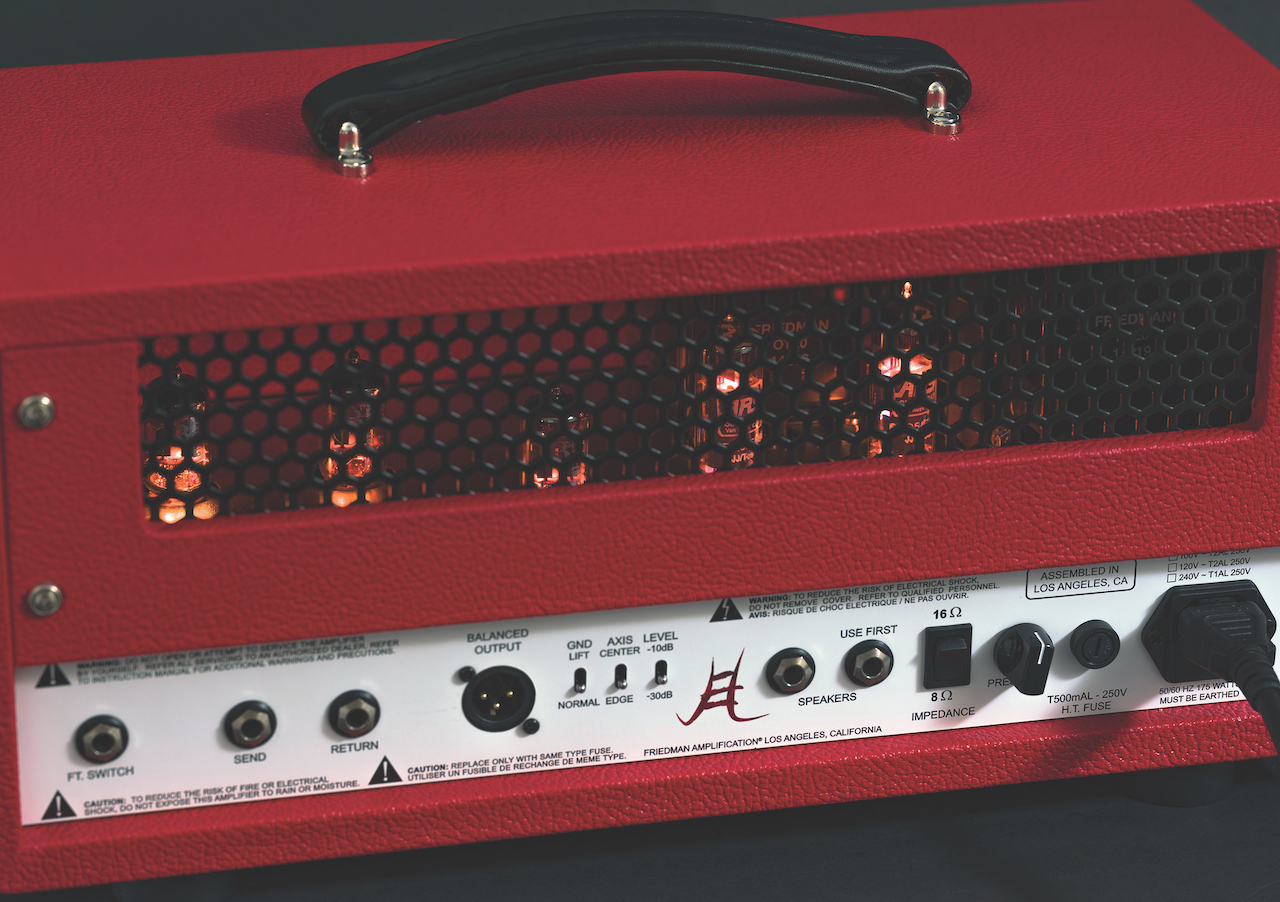
Tuning into Channel 1
The truly great thing about the JEL-20, though, is that it offers two scrumptious, yet strikingly different amp sounds in one head, which brings us to the other half of the JEL-20 experience: channel 1. Essentially the same channel 1 that Lee and other Friedman fans love on the aforementioned Smallbox 50, this isn’t one of those “throwaway cleans” you find on some high-gain heads.
As you gradually roll back the master 1 level and bring up the gain 1 knob, this channel takes you from ice-storm clean to lava-hot overdrive. Push it hard and it will deliver you to the doorway of heavy rock and metal, where channel 2 takes over. And, inspired by everything from 20-watt Marshall combos to hot-rodded Plexi heads, channel 1 is quite dynamic. Even with a lot of gain, it cleans up nicely if you know how to ride your guitar’s volume knob.
A bonus feature on this amp is the saturation switch on the front panel, which gives the JEL-20 even more compression, resulting in yet another increase in perceived sustain (albeit with a slight decrease in overall amp volume). While I doubt you’ll use this setting regularly onstage, it’s fun when you want living-room-level shred-god tones that won’t make enemies of your neighbors.
It's a handy sampling of ’70s rock, ’80s metal, and modern high-gain guitar that travels well
The huge Easter egg on the JEL-20, though, is its fully attenuated onboard cabinet simulation, which outputs through a back-panel XLR jack. This allows you to safely run the amp straight to the console – even without a speaker load.
I test-ran the JEL-20 direct (but with the cabinet still cranking) at one soundcheck, and our mix engineer was impressed with the direct sound. Although we ultimately stuck with the mic-on-speaker tone (he said it was more natural sounding through the mains), it’s obvious how useful the JEL-20’s direct option would be in less amp-friendly rooms or in project studios.
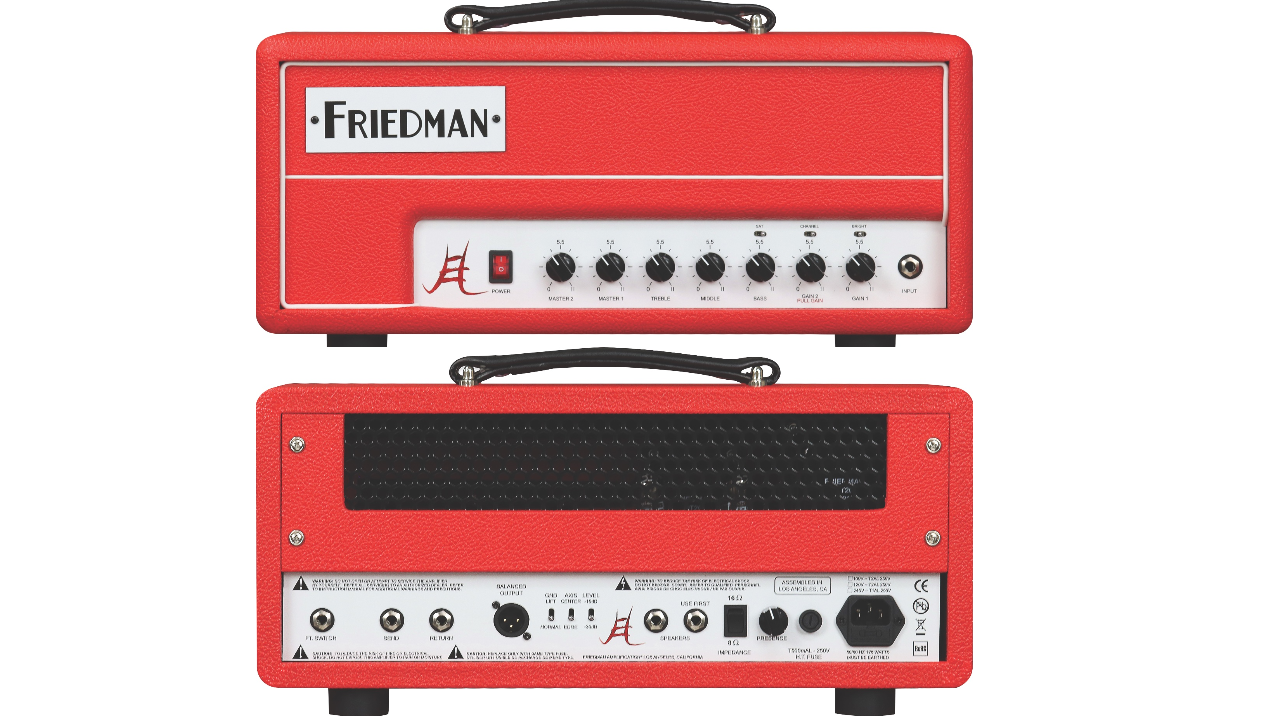
While these bonus features are certainly welcome, the best thing about my run with the JEL-20 is that I simply couldn’t find a bad tone on it. I also loved being able to wheel it right onto the plane hassle-free in a TSA-approved carry-on–sized roller bag.
There’s a reason guitar heroes such as Phil X, Steve Stevens, Jerry Cantrell, Bill Kelliher and now Jake E. Lee each have signature heads with Dave Friedman and seem to view him as the Willy Wonka of rock guitar tone.
His amps deliver many of the things we love about big ’70s rock, molten ’80s metal, and modern high-gain guitar – and often in one chassis. And if you want a handy sampling of these sounds that travels well, the JEL-20 might just be your golden ticket.
Specifications
CONTACT Friedman
PRICE $1,699
CHANNELS Two
CONTROLS Master 2, master 1, treble, middle, bass, gain 2 (with pull boost), gain 1. saturation, channel and bright switches
BACK PANEL Foot-switch jack, series effects loop jacks; cabinet simulation XLR output with ground lift, mic axis, level switches, speaker jacks, 16Ω/8Ω impedance selector, presence control
POWER 20 watts
TUBES Two JJ EL84 power tubes, three 12AX7 preamp tubes (one JJ ECC83S, two BT-12AX7), all PCB-mounted
EXTRAS Channel-switching foot switch
WEIGHT 22 lbs
BUILT USA
KUDOS Exhilarating two-channel rock machine. Cabinet simulation. Fits in overhead luggage bin
CONCERNS No one would complain if Channel 2’s push/pull boost was foot-switchable
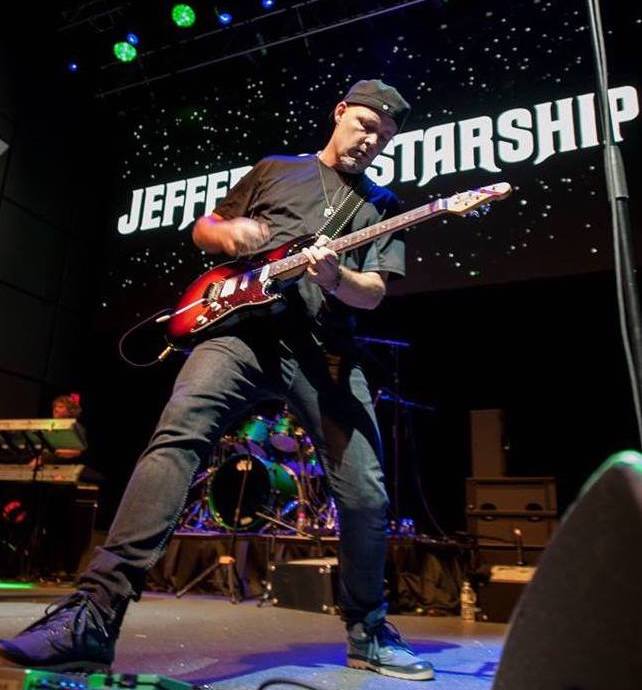
Whether he’s interviewing great guitarists for Guitar Player magazine or on his respected podcast, No Guitar Is Safe – “The guitar show where guitar heroes plug in” – Jude Gold has been a passionate guitar journalist since 2001, when he became a full-time Guitar Player staff editor. In 2012, Jude became lead guitarist for iconic rock band Jefferson Starship, yet still has, in his role as Los Angeles Editor, continued to contribute regularly to all things Guitar Player. Watch Jude play guitar here.
